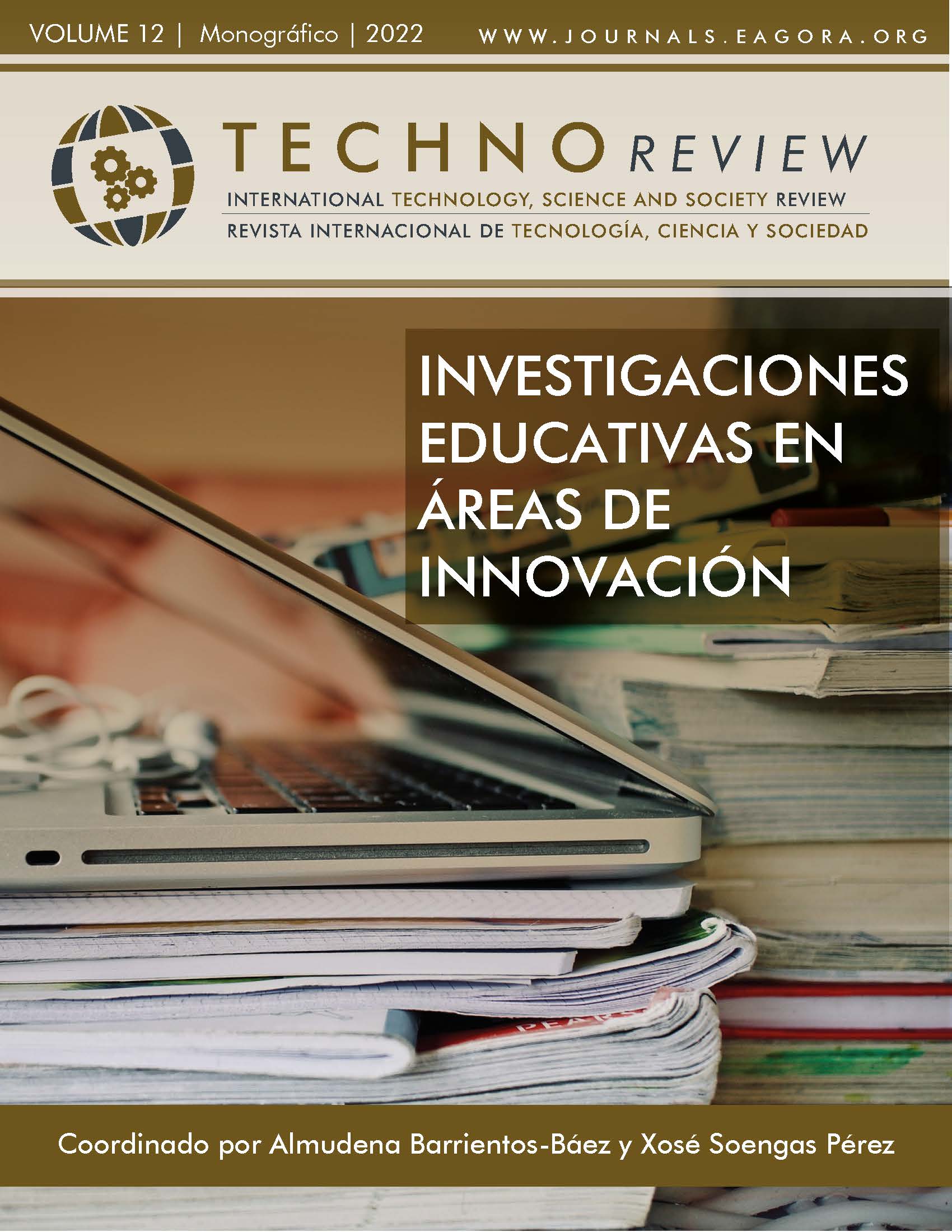Socio-educational intervention through virtual learning platforms the e-APSA case
El caso E-APSA
DOI:
https://doi.org/10.37467/revtechno.v11.4420Keywords:
Socio-educational intervention, Virtual learning environments, Acceptance of technology, Intellectual disabilityAbstract
Virtual learning environments (EVA) allow the creation of processes where training and didactic interaction between teachers and students occur through courses, virtual tutorials, forums, etc., regardless of their location and the time at which they access.
The objective of this work is to evaluate the EVA e-APSA, created with the aim of supporting communication and socio-educational intervention in the APSA association, an NGO aimed at people with intellectual disabilities and their environment to improve their quality of life, maximizing their autonomy and the development of their potential.
References
Baker, S., Sanders, M. R., & Morawska, A. (2017). Who Uses Online Parenting Support? A Cross-Sectional Survey Exploring Australian Parents’ Internet Use for Parenting. Journal of Child and Family Studies, 26(3), 916-927.http://doi.org/10.1007/s10826-016-0608-1
Best, P.; Manktelow, R. y Taylor, B. (2014). Online communication, social media and adolescent wellbeing: A systematic narrative review. Children and Youth Services Review, 41, 27-36. https://doi.org/10.1016/j.childyouth.2014.03.001
Davis, F.D. (1989). Perceived Usefulness, Perceived Ease of Use, and User Acceptance of Information Technology. MIS Quarterly, 13(3), 319-340. DOI https://doi.org/10.2307/249008
Fernández-Rodrigo, L. (2018). Las TIC en programas socioeducativos: Evaluación de un Entorno Virtual como medio de soporte a profesionales en la implementación del programa Caminar en Familia. (Tesis doctoral Universidad de Lleida). Recuperado de http://hdl.handle.net/10803/665034
Ferreira Szpiniak, A., & Sanz, C. V. (2007). Hacia un modelo de evaluación de entornos virtuales de enseñanza y aprendizaje. XIII Congreso Argentino de Ciencias de la Computación, 932-947. Recuperado de http://hdl.handle.net/10915/22695
Fishbein, M. y Azjen, I. (1980). Understanding attitude and predicting social behavior. Prentice Hall.
Gaviria, E., López Sáez, M., Cuadrado, I. (2013). Introducción a la psicología social. Sanz y Torres, (Capítulo 6, pp. 201-228).
Gibson, L. & Hanson, V. (2013). Digital motherhood: how does technology help new mothers? En W. E. Mackay (Ed.), Proceedings of the SIGCHI Conference on Human Factors in Computing Systems (pp. 313- 322). ACM. https://doi.org/10.1145/2470654.2470700
González-Mataix, P. (2018). Auditoría TI en la Asociación APSA. Trabajo fin de grado del grado de ingenieria informática de la Universidad de Alicante. Recuperado de: https://acortar.link/ujRMsg
Iglesias-Rodríguez, A., Olmos-Migueláñez, S., Torrecilla-Sánchez, E. M., & MenaMarcos, J. J. (2014). Evaluar para optimizar el uso de la plataforma moodle (studium) en el departamento de didáctica, organización y métodos de investigación. Tendencias pedagógicas, 23, 155-170
López Alonso, C. y Matesanz del barrio, M. (eds.) (2009). Las plataformas de aprendizaje: del mito a la realidad. Madrid, Biblioteca Nueva.
Ma, Q. y Liu, L. (2006). The Technology Acceptance Model. Journal of Organizational and End User Computing, 16(1):59-72. DOI 10.4018/joeuc.2004010104
Marcillo, C., Anzules, H., Cedeñ o, J., Macías, S., Marcillo, J., Merchán, J., … Caballero, A. (2015). Implantación de un entorno virtual de aprendizaje en la Universidad Estatal del Sur de Manabí. Apertura: Revista de Innovación Educativa, 7(1), 1.
McDaniel, B.T., Coyne, S.M. y Holmes, E.K. (2012). New mothers and media use: associations between blogging, social networking, and maternal well-being. Maternal and Child Health Journal, 16, 1509-1517. DOI 10.1007/s10995-011-0918-2
Niela-Vilén, H.; Axelin, A.; Salanterä, S. et al. (2014). Internet-based peer support for parents: A systematic integrative review. International Journal of Nursing Studies, 51(11), 1524-1537. https://doi.org/10.1016/j.ijnurstu.2014.06.009
Nieuwboer, C. C.; Fukkink, R. G. y Hermanns, J. M. A. (2013). Peer and professional parenting support on the Internet: A systematic review. Cyberpsychology, Behavior and Social Networking, 16(7), 518–528. https://doi.org/10.1089/cyber.2012.0547
Orellana López, D. M., y Sánchez Gómez, M. C. (2007). Entornos virtuales: nuevos espacios para la investigación cualitativa. Revista Electrónica de la Educación: Educación y Cultura en la Sociedad de la Información, 8(1), 6-24. https://www.redalyc.org/articulo.oa?id=201017309002
Panter-Brick, C.; Burgess, A.; Eggerman, M. et al. (2014). Practitioner Review: Engaging fathers – recommendations for a game change in parenting interventions based on a systematic review of the global evidence. Journal of child psychology and psychiatry, 55(11), 1187-1212. https://doi.org/10.1111/jcpp.12280
Roig-Vila, R., y Belmonte, M. L. (2021). Entornos virtuales de aprendizaje al servicio de la sociedad. Evaluación de necesidades del Proyecto e-APSA. EDMETIC, 10(1), 100-117. https://doi.org/10.21071/edmetic.v10i1.12733
Rosser-Limiñana, A.; Jareño-Ruiz, D. y López-Sánchez, C. (2018). La aplicación móvil como estrategia de educomunicación orientada a la eliminación del castigo físico en menores. El caso de Hands up. Revista Mediterránea de Comunicación, 9(2), 189-202. https://www.doi.org/10.14198/MEDCOM2018.9.2.22
Salinas, I. (2011). Entornos virtuales de aprendizaje en la escuela: tipos, modelo didáctico y rol del docente. Pontificia Universidad Católica Argentina, 1-12. 310 Recuperado de https://acortar.link/Zs5wrM
Torres, A. y Rodrigo, M. J. (2013). Una experiencia de educación parental mediante entornos virtuales de aprendizaje. Sistema, Cibernética e Informática, 10(1), 45-49. Disponible en https://goo.gl/jrCJ9p
Tregeagle, S. y Darcy, M. (2008). Child Welfare and Information and Communication Technology: Today’s Challenge. British Journal of Social Work, 38(8), 1481-1498. https://doi.org/10.1093/bjsw/bcm048
Vaquero, E.; Ius, M.; Milani, P. et al. (2016). Una revisión de la literatura sobre el uso de las TIC en el ámbito de la intervención sociofamiliar. En R. Roig (Ed.). Tecnología, innovación e investigación en los procesos de enseñanza-aprendizaje (pp. 1920-1928). Octaedro.
Vaquero, E.; Urrea, A. y Mundet, A. (2014). Promoting resilience through technology, art and a child rights-based approach. Revista de Cercetare si Interventie Sociala, 45, 144-159. Disponible en https://goo.gl/d6CzCA
Venkatesh, V. y Davis, F. D. (2000). A theoretical extension of the technology acceptance model: Four longitudinal field studies. Management Science, 46 (2), 186-204. DOI https://doi.org/10.1287/mnsc.46.2.186.11926
Venkatesh, V., Morris, M.G., Davis, G.B. y Davis, F.D. (2003). User Acceptance of Information Technology: Toward a Unified View. MIS Quarterly, 27(3), 425-478. DOI https://doi.org/10.2307/30036540

